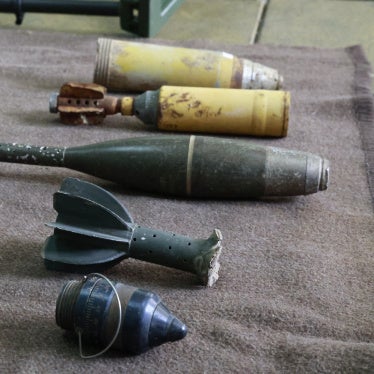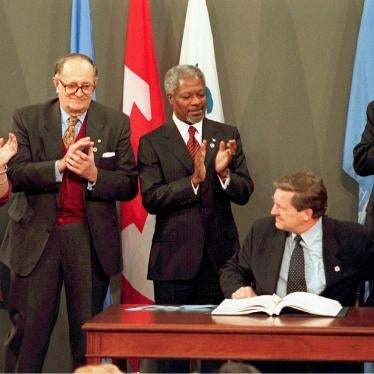Mr. President,
The ICBL has often remarked that the overall, long-term record of compliance with the Mine Ban Treaty has been exemplary, and that its model of cooperative compliance has proven itself to be a winner.
That record has obviously been blemished seriously in recent years by the first confirmed use of antipersonnel mines by a State Party, in Yemen in 2011-2012, and by the long-missed stockpile destruction deadlines for Belarus, Greece, and Ukraine, all of which remain in violation of the treaty, and for Turkey before its completion in 2011.
In addition, there have been serious use allegations against States Parties South Sudan, Sudan, and Turkey.
There are also ongoing compliance concerns related to Articles 3, 5, and 7. On Article 3, it is more clear with each passing year that many States Parties are keeping mines under the Article 3 exception without ever using them for any of the permitted purposes; these are in essence stockpiled mines, not mines retained for training or development.
On Article 5, one State Party, Ethiopia, has been in violation of the treaty for missing its clearance deadline without having requested an extension in time, while more generally, there has been a disappointing—and life-threatening—lack of respect for the obligation to clear all mined areas as soon as possible, but not later than ten years after entry into force.
On Article 7, the compliance rate for the transparency reporting requirement falls lower every year, now reaching a level that indicates indifference if not disdain for this legal obligation.
Against this backdrop, States Parties wisely and appropriately created the Committee on Cooperative Compliance. We commend the Committee for the admirable job that it has done in looking at use allegations within the territories of States Parties. The Committee’s activities have helped promote a healthier and more credible Mine Ban Treaty. We believe the Committee can help not only to resolve outstanding compliance cases, but also help to deter others from arising.
Despite the Committee’s good work, it has reported that questions still remain and more investigations are needed with respect to use in Yemen and use allegations in South Sudan and Sudan. The work is clearly not yet done. We welcome South Sudan’s statement yesterday that when the security situation permits, it would like to undertake a joint investigation with UNMAS and civil society.
The Committee has concluded that, “In view of the the information received from Turkey,” the Committee has decided not to pursue further examination of the allegations. Yet, the Committee and Turkey have not fully shared the documentation and information provided by Turkey.
We believe crucial documentation provided by those alleged to have used antipersonnel mines should be shared with all States Parties. After all, it is the duty of all States Parties, not just the Committee, to ensure compliance with the treaty.
We also continue to believe that it would be beneficial for the Committee to look not only at compliance concerns related to use, but other areas within its mandate as well, including stockpile destruction and mines retained for training.
Mr. President, it is also vital to promote compliance with the norm being established by the Mine Ban Treaty: that there should not be any use of antipersonnel mines by any actor under any circumstance.
In that regard, it is regrettable that Landmine Monitor has reported use of antipersonnel mines by government forces in three countries in the past year (Myanmar, North Korea, and Syria) and by non-state armed groups in ten countries (Afghanistan, Colombia, Iraq, Libya, Myanmar, Pakistan, Syria, Tunisia, Ukraine, and Yemen). This is the largest number of countries with use by non-state armed groups since 2006. It is marked by extensive use in Afghanistan and Iraq—notably use in both of victim-activated improvised explosive devices, which are prohibited by the Mine Ban Treaty—and new use in Ukraine and Yemen. States Parties should condemn any new use by non-state armed groups as well as government forces.
One final point needs to be made. In several of the States Parties where opposition forces are using antipersonnel mines, there are questions about where the mines have come from, and whether unknown, undeclared, or unsecured stocks could be the answer. This is another compliance issue that should be explored.
Thank you.








